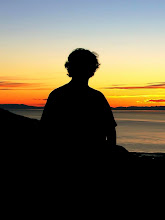The need for such an approach arises from the subjective experience of objective reality that we know as the human condition. I began by granting the fact of my own existence. This allows me to work under the assumption that my identity, which I seek, exists, in some form and thereby, simplifies the problem manifold. In so doing, I have established the ‘fact’ of my existence as the frame of reference, the foundation upon which all other knowledge I possess is predicated.
The next step was to define that which I sought. Upon some consideration, I redefined my question as “Do I have an identity that extends beyond context, i.e. my past and present experiences and actions?” The simplest experiment I could think of was to try and observe myself in a radically different context. From a reductionist standpoint, there are two significant weaknesses in the experiment’s design: a) as both observer and subject, I’d be prone to bias and, b) being privy to my observations, I’d invariably be affected by them, i.e. the act of observation would alter the subject of study. However, these could be offset to a degree by recognizing and accounting for them, as far as possible.
Moving halfway across the globe to begin by graduate studies gave me the perfect opportunity to conduct such an experiment. It is important to acknowledge that the need for the physical separation from my past stemmed from my lack of mental discipline at the time. Over the last five years, I’ve been engaged in a continuous, iterative process of introspection and self-assessment. At each step, I became aware of the impact that the knowledge, thus gained, was having upon me. Observing my own evolution, I came to the realization that it should be possible for me to consciously guide the process, at least to a degree.
Over time, as I changed and grew more and more comfortable in my own skin, I noticed improving clarity in my self-observation. The act of observation was changing that which was being observed as well as the observer – after all, compartmentation of thought notwithstanding; they are both the same entity. Along the way, I’ve come to realize also that the process of seeking is continually revising my definition of that which I seek. Indeed, I’ve come to look upon ‘my identity’ very differently now.
For the longest time, I was troubled by the immense influence of my circumstances upon my identity. I desperately sought to discover for myself a context-independent identity; so that I could see myself more than the sum of my past experiences and actions. This is no longer a concern for me. I see now the flaw in my linear, reductionist approach to the problem. I find it more apt to describe myself as a complex adaptive system and my identity is an emergent behavior/property of the system (i.e., me). Therefore, while my identity is informed by my past, it is different from the sum of my past. The question of whether one is more or less does not arise, because the process of my evolution is non-linear, far from monotonic and not commutative.
My response to new experience is heavily influenced by my history and the different parts of my history do not always exert the same level of influence. Therefore, I no longer consider my identity in linear terms or even as a function of time even thought it is constantly evolving in time. While I recognize the infinite nature of one’s search for one’s identity, I no longer consider it a journey in simple space-time. Rather it is more akin to an evolutionary optimization problem, where one is constantly redefining the optimum criteria based on new input even as one tries to more towards it. This idea in turn leads me back to the concept of ‘wu wei’ – I mustn’t stagnate nor must I hurry. The key is to be conscious of all my experiences and actions which in and of itself is an ideal to strive for. And, to me this provides a rather satisfactory answer to what I’m doing with my existence – I’m learning – about myself and about the universe (well, the infinitesimal fragment of it that I interact with). It is both the means and the end, at least to me.

1 comment:
Hmm,
Any observer's 'understanding' of her/his 'self' at any period in her/his personal evolution is contingent upon the ideas said observer chooses to use to describe their experiences and the 'self'.
Accepting a certain set of ideas automatically leads one to interpret incoming information in the light of what one has accepted, however tentatively. To be aware of this, is hard enough.
You see yourself as a complex adaptive system as opposed to a unitary self and current neuroscientific understanding would support you - yet...you'd be surprised and perhaps pushed a teeny-bit from your 'center' when you begin to contemplate the implications such a view has for your morals, ethical principles and ideals (I believe you are attempting this too).
Every 'truth' is defined and verified only within a pertinent formal system...and truths beyond the ken of a system (as Goedel showed), do exist...but are unverifiable...so you could actually think of seeking as a process of building formal systems to accomodate each Goedel statement that stymies the seeker...only to find a new one wagging its finger at her/him.
I'll still ask you about your positions on certain things being 'right' or 'wrong'.
I confess I'm no fan of relativisation in some respects. I'm audacious or foolhardy enough to assume context-independence and see where it takes me.
Individual differences dude - we'll all be disagreeing on some things and agreeing on others till we end up in that awfully boring Symposium in the Sky :)
Post a Comment